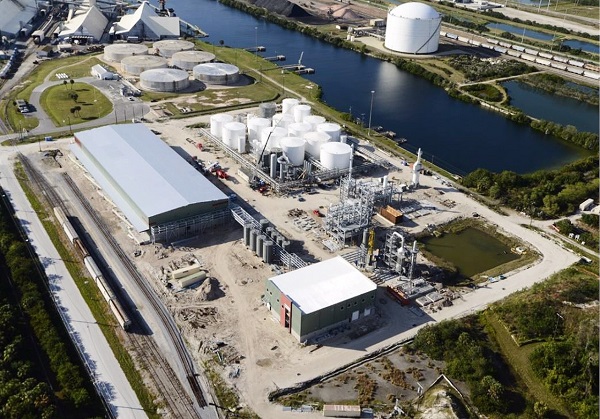
Puralube plans to partner with NexLube Tampa to complete its Florida rerefinery and enable it to produce API Group III base oil by 2018, according to documents for a meeting this week of the governing board of a Florida port. The rerefinerys construction was suspended in late 2013.
During a meeting yesterday, Port Tampa Bays board approved the transfer of a lease agreement from NexLube Tampa LLC to Puraglobe Florida LLC – contingent upon completion of a joint venture between NexLube and Puralube – Andy Fobes, Port Tampa Bays director of public affairs, confirmed to Lube Report.

Photo: NexLube Tampa LLC
Puralube and NexLube Tampa are forming a joint venture to complete NexLubes project in the Port of Tampa as a Group III rerefinery anticipated to begin operating by the second quarter of 2018.
In June 2012, Port Tampa Bay entered into a lease agreement with NexLube Tampa LLC for a 20-year term, with two five-year lease extension options to construct a used oil reprocessing and blending plant on 12 acres.
Puralube and NexLube Tampa officials confirmed to Lube Report that they have reached a basic agreement to form a joint venture that will finish building the plant and are now in a due diligence phase. The tentative agreement was first reported by the Tampa Bay Times.
The port authority document indicated the proposed lease transfer to Puraglobe would not require a change in the use of the site because it would remain a used oil reprocessing and blending plant. However, the rerefined base oil production would be Group III base oil instead of Group II, with the processing plant completed using patented HyLube catalytic processing technology developed by Des Plaines, Ill.-based UOP, a Honeywell company. Puralube acquired exclusive rights to the technology in 1995.
Upon completion of the joint venture, NexLube would assign the lease to Puraglobe, and Puraglobe would assume all of NexLubes obligations under the lease and complete the project.
According to the Port Tampa Bay document, NexLube has remained current throughout the lease in its financial obligations to Port Tampa Bay under the lease. The port authoritys staff indicated its not aware of any outstanding payments due to subcontractors or supplies relating to construction of the improvements on the site.
In July 2012, NexLube began construction of its facility to process used oil to produce finished lubricants, ultra-low sulfur diesel and asphalt flex products.
As of October 2013, NexLube officials told Lube Report that the facility was expected to process 24 million gallons of used oil annually and produce about 20 million gallons per year of Group II base oil in three viscosity grades: 85, 150 and 330.
According to the Port Tampa Bay meeting document, when the project was suspended in November 2013, NexLube had invested more than $100 million into the facility and substantially completed construction of a 56,000-square-foot blending and storage building, a 20,000 square office building, about 30 above-ground storage tanks ranging in size from 10,000 to 900,000 gallons, piping and foundations for the processing unit. At that time, the port authority document indicated, NexLube stated that it believed the project was viable and needed time to evaluate its options due to the substantial increase in projected costs.
Since that time, NexLube had sought a partner to help it complete the project.
Puralube Inc. is based in Wayne, Pennsylvania. Frankfurt, Germany-based Puralube GmbH is a subsidiary of it.
In January, Puralube revealed plans to upgrade one of its rerefineries in Troeglitz, Germany, to enable production of Group III base oil in the first quarter of 2017. The company said it intends to deliver the product to existing customers in the country and Europe and consider exporting the base oil out of the region as well. Group III production would be 50,000 metric tons year year, the company said in a news release at the time. Its two existing rerefineries at the site each of have 50,000 t/y Group II+ base oil production capacity.